August’s Surrey WI News is now available for you to read online. It is available to view on your phone, tablet or computer via Flipsnack@ August Surrey WI News.
back to News
Make posts appear on News page
August’s Surrey WI News is now available for you to read online. It is available to view on your phone, tablet or computer via Flipsnack@ August Surrey WI News.
back to News
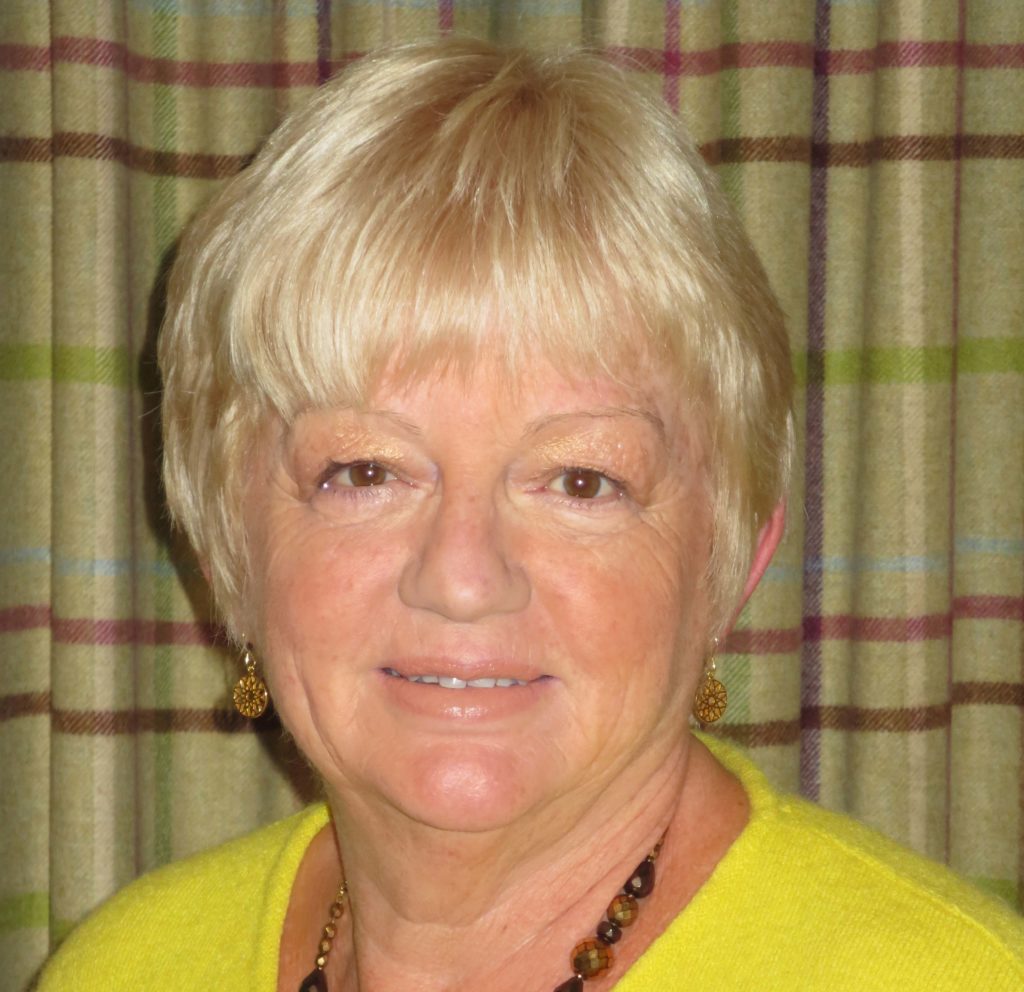
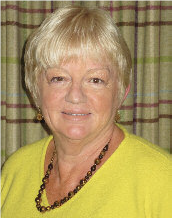
Many of you enjoyed the inspiring speakers at our March Annual Council Meeting and the similarly engaging speakers at the NFWI Annual Meeting in Liverpool in June. How fortunate we are, as WI members, to have the opportunity to hear so many excellent speakers, including those at our own WIs.
Communication in the form of public speaking can be daunting and is often a barrier to members’ participation in committee work both with their own WI and the Federation. Because of this they are missing out on an enriching experience. What a shame this is, and something that I wish to remedy.
You may well think that as a university lecturer, I learned my trade at work, but you would be wrong, because it was a result of both nurture and nature. My grandfather was a grocer. He could sell anything to anyone, and what’s more, his customers would be delighted with what they had bought, especially as there was always a little extra thrown in.
Another role model was my father, a headteacher. Whether it was addressing an audience or selling raffle tickets for charity outside the supermarket, he just ‘had it’, and I was inspired.
But where did I gain my experience? I attended Sunday School and regularly read in chapel. It became second nature. As a teenager, I was inspired by my English teacher Miss Smith, who lost the love of her life in WW2, and so dedicated her life to us. She read with great enthusiasm, vitality and drama. So much so that long before she reached a humorous episode she would be laughing helplessly . She too was inspiring.
But does this skill of public speaking come naturally to us? We might have that innate ability, but it can be learned. Whatever our experience we still have to make that first vital step, to speak to the meeting. Very many of you have already taken this step, but for some, this is a barrier to participation. Its time for us now to challenge and overcome this barrier. So how can we do this?
Prepare and practice
Nerves — well they are both a curse and a blessing. I was always nervous when I addressed a class of students for the first time. The adrenaline was both welcome and necessary, and I promised myself that if I ever didn’t feel nervous in that situation, then I should give up teaching. Fortunately, the ‘nerves’ stayed with me and I benefited from them, whether in the lecture room or at the Federation Centenary Service at Guildford Cathedral.
But are we all capable of this? I certainly didn’t think that I was. So how should we proceed?
The first step is to know your audience. Someone offered me a tip recently of imagining everyone in the hall naked!? I don’t think that we need to get that familiar with our audience! The next step is to prepare, prepare, prepare, and practice, practice, practice.
I have been told that my garden grows well because I practice my presentations by reading them aloud to it. Have a go. On the day, keep the microphone close to your mouth. Listen to yourself through the speaker and speak slowly and clearly. Master the technology.
Performance
If you are nervous about using PowerPoint (PP) then don’t use it. It can be a distraction rather than an aid if used poorly. Instead, use a few select images as a memory prompt rather than acres of potentially illegible text.
You are now in front of your audience. Be aware of them, make eye contact, ensure that you embrace everyone in the room with both gesture and eye, and also with your content — avoid acronyms and colloquial or cliquey speech.
It’s now time to speak. It’s all an act, a performance, you can be whoever you want to be. Picture yourself as that person — think shoes, clothes, makeup, hair. Did you have shoe envy when Alieda Moore walked onto the stage? I did, but I could never have walked in them, so choose carefully!
Your audience is your friend and they are there because they want to be there. They are keen to hear what you have to say. Be friendly, speak with honesty and smile when appropriate. If you mention an individual, make eye contact. A positive response from them will boost your confidence. Know what you want to say and keep it simple and concise.*
A recent article on the BBC news website included a fascinating composite image of Volodymyr Zelensky. In March 2022 he addressed ten parliaments across the world via social media, for which he received standing ovations. What fascinated me, beyond his brutal message, was that as an actor, he knew how to engage with his different audiences, not only in his content which recognised significant cultural differences and histories, but also through gesture. This was a fascinating insight into the value of communication.
This emphasises the fact that communication is not only through word but critically also through gesture. An emphasis on diverse modes of communication has been in the media recently because of deaf awareness week and the proposal to Parliament to give British Sign Language legal recognition.
Makaton bursaries
As a grandparent of a child with complex needs, I know at first hand the value of communication through gesture, and in our case through Makaton. Makaton is a form of sign language that is familiar to many children as it is integrated into many BBC children’s programmes. It is an international language and used by people with a wide range of communication challenges, and those for whom English is a second language.
It has a particular relevance currently as a vehicle through which to communicate with our Ukranian guests, who may have limited English. It is for these reasons that the Federation will be offering bursaries to members to undertake a level 1 and 2 Makaton training course. Watch this space.
Why am I telling you this? Because I have been told that one of the key reasons members are reluctant to take on WI roles is because they have a fear of speaking in public. So, I invite you to speak to your meeting, to welcome that adrenaline rush, to gain pleasure from doing it, and to open a gateway for yourself to new experiences with both your own WI and the Federation.
* Please let the office know if you would like us to put on some public speaking workshops.
Carol A. Gartrell
Federation Chairman
back to News
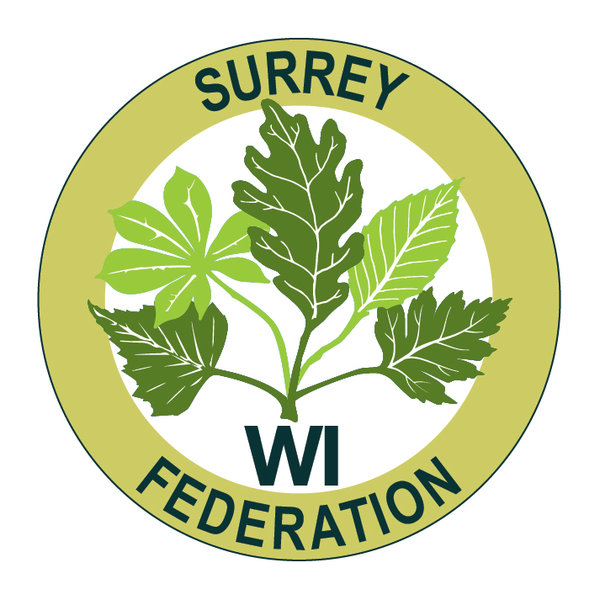

TACKLING loneliness has always been part of the WI’s ethos and members brought it to the forefront of our national campaigning agenda with the launch of the Link Together campaign in 2017 to raise awareness of the causes and impacts of loneliness.
Now we have received a message from Gemma Jones on behalf of Reconnections, a local service that matches volunteers to older people who are lonely or socially isolated.
She says: “We’re working hard in the Guildford and Waverley area to raise awareness and I wondered whether I could come to a WI meeting to talk to your members about what we’re doing.
“We aren’t raising funds, it’s simply awareness and we have some lovely stories to share of local matches where volunteers have helped people break the cycle of loneliness.”
If this is something that might be of interest to your WI, you can call Gemma on 07595 201430.
back to News
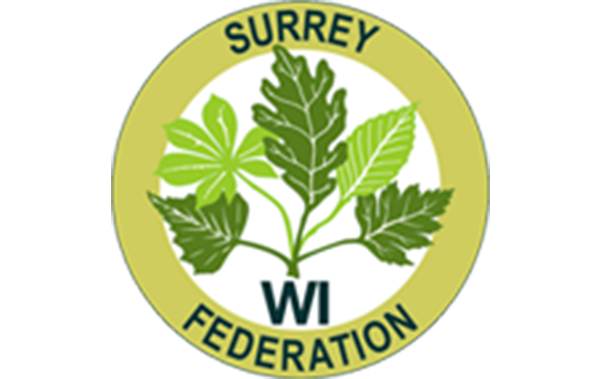

This sub committee offers talks, demonstrations and workshops in a wide variety of subjects which include crafts, food, nutrition, cookery and gardening. The WI is known for its skills in these subjects which become very apparent in our fund-raising events, whether they are a “Loaf and Ladle Lunch”, a “Ploughman’s”, a “Cream Tea” or a “Harvest Supper”, accompanying a topical talk or demonstration. We encourage members to train for national qualifications in all relevant subjects, to enable them to be judges at county and village shows.
CRAFT; Classes are offered to groups of 10 to 12 members at either SFWI headquarters or at a range of other venues, including village halls. In the past classes have been offered in willow work, crochet, quilting, patchwork, spinning, painting and drawing, embroidery and beading, to name a selection. Our “Craft Dabble Days” offer a taster session where members are able to choose a couple of activities to participate in; these sessions are particularly popular and have 90 to 100 participants, taught by volunteer tutors.
FOOD AND NUTRITION; These classes are offered on a regular basis to groups of up to 12 and may be half or full day courses. Participants may have the opportunity to watch demonstrations and take part in discussion on foods and nutrition and food safety, or may participate in preparing foods to taste or take away.
GARDENING; Gardening enthusiasts have visited some beautiful gardens and have enjoyed speakers on a variety of subjects including bee keeping and farming.
We are investigating alternative courses and venues following the closure of Denman College for all the above subjects
The SFWI Crafty Ladies meet six times a year on the first Wednesday in January, March, May, June, July, September and November. They meet to practice their crafts, talk and exchange information and usually book one outside speaker through the year. See Surrey WI News, the Surrey Website and Social Media for details.
back to News


I WOULD like to say “welcome” to all our new WI members and I hope you have a great time finding friends and learning new things.
I expect we can all remember our first meeting, walking into the hall/meeting place, not knowing anyone and finding ourselves surrounded by a lot of women who all know each other.
A lovely lady called Victoria took me under her wing, made me feel welcome, introduced me to a couple of other ladies and guided me through the meeting, explaining each part as it went along.
This encouraged me to return as I had made friends who welcomed me to the next meeting and introduced me to more members.
And so my WI journey began.
I would like you to think about your own WI; I imagine it has the same welcome and encourages members to greet visitors with a smile, say hello, and include them in the meeting.
However, a few WIs leave visitors to flounder, to find their own way, making them feel lonely in a room full of strangers, unsure of how the meeting runs.
This is sad when we know we have a great capacity for friendship, fun and kindness. It’s one reason why I love visiting other WIs, I am always made so welcome and know I will have a wonderful time.
Review
Do you think your WI should review the way you greet visitors to see if improvements could be made to the way they are welcomed?
Talk to your members and see how they feel about their first few meetings. You could have a welcome sub-group to plan a new members’ coffee catch-up, or invite visitors for coffee and chat with a few members prior to the meeting so they are not confronted by a lot of strangers.
Ideas like this will encourage more ladies to join the WI, make friends and broaden their horizons. – Chris Wilson, WI Adviser
back to News
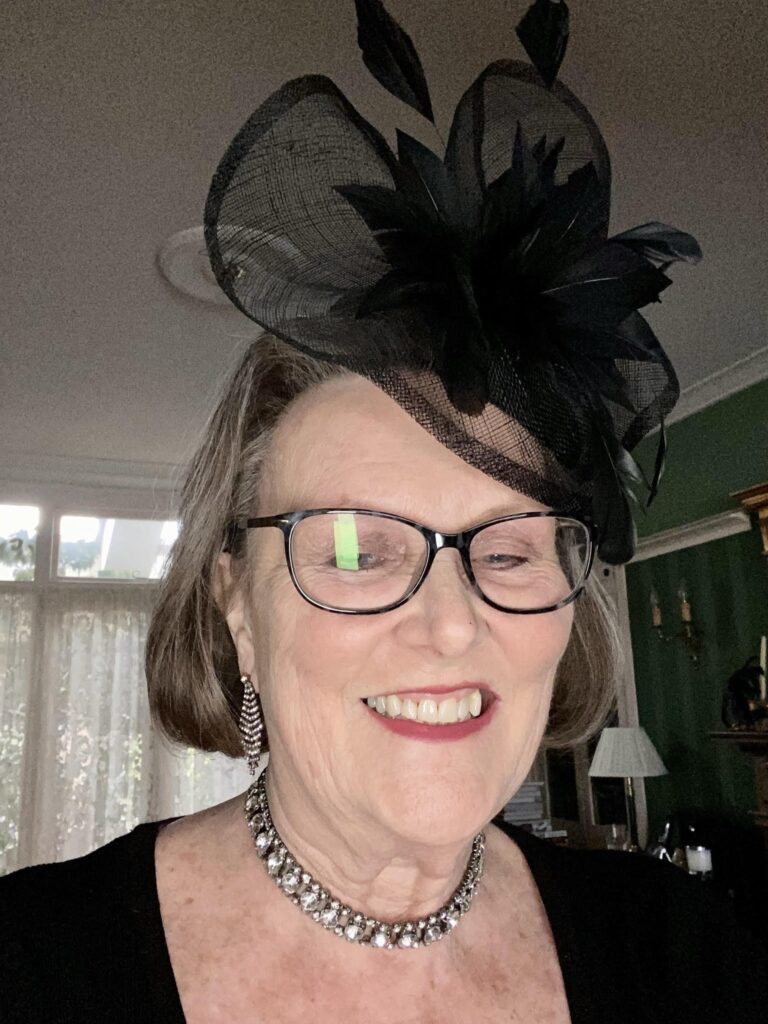
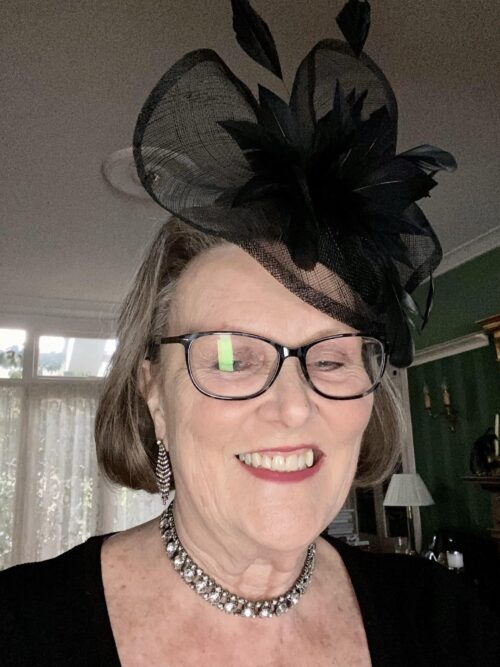
MEET Jan Jenner, who has been appointed as a Trustee of Surrey Federation. Jan is retired from her job as an executive assistant working in investor relations for a large company and became President of Maple Village WI in November 2021. She says she is still learning the ropes.
“We are a very friendly WI and I belong to several sub groups: Carpe Diem, Ladies who Lobby, Photography, Sunday Lunch Club and Mindfulness & Meditation,” she adds.
back to News
Come and join us! We are a small, friendly group meeting every two weeks on a Saturday morning with a professional musical director and accompanist.
We sing for pleasure, have been very successful at various music festivals and we plan to sing at the Autumn Federation Meeting at Dorking Halls on October 10.
We enjoy entertaining groups including WIs, retirement homes, golf clubs etc. with a varied repertoire.
Our lively conductor makes rehearsals fun for everyone; the ability to read music is not a requirement and there are no auditions.
Members come from all over Surrey and we are happy to carshare. And you don’t have to be a WI member — so why not come along, bring a friend and give us a try?
Meetings are at Albury Village Hall on the 2nd and 4th Saturdays of the month from 10am-12.30pm. And there’s coffee and cake too!
Want to know more? Contact Gill or Maggie 07754 546729.
back to News


The very serious and topical article An end to Doom-Scrolling in the May/June edition of WI Life describes the activity of constantly accessing news that I am sure we have all been involved in and which has the potential to severely impact our mental health.
The term Doom-Scrolling initially had a very different connotation for me as it took me back to the 1970’s Sci-fi TV programme — Doomwatch. It featured my first ever screen heart throb, Robert Powell, aka Toby Wren who met his fate in a bomb explosion on what was, in real life, Cromer Pier. I recall the barbed wire that encased it on a visit to Cromer whilst it was being filmed, and I was amused by the shocked faces of passers-by on the promenade, who did not realise that a film shoot was taking place!
The thought-provoking and well-evidenced article advises us to limit our over-engagement with news. Our constant tracking of the progress of Covid has become symptomatic of these times, and with the hellish situation in the Ukraine, one feels not only the necessity to keep constantly up to date but to do this out of a feeling of guilt, prompted by the need to offer support in whatever way is possible.
But what does this do for our mental health? I am minded, in this mental health awareness week to encourage you to take care of your own mental health, give yourself time to re-adjust, not to be pressed into doing things that you are not yet ready to do, to look forward, to not worry about the things you cannot change, to take something positive from each day not only now but also in the future.
Is this Doom-Scrolling habit the best way for us to support the people of the Ukraine? As Ukrainian refugees arrive and are welcomed into our communities and homes, there are many more practical and productive ways that we as WI members can make a difference.
It is not the first time that we have welcomed refugees. I recall Lydia and Helen from Estonia, and John from Poland* joining us at our primary school in a West Yorkshire village back in the late 1950s. Both they and their families quicky became part of the community as our cultures were shared, as children, through the food we ate together, our clothes and the games we played. I am still in contact with John some 60 years later. This is one of the great benefits of social media. But how can we provide support? How can we enable these families to engage with and feel part of our communities whilst maintaining their cultural identity?
A friend is welcoming a family of five into her home. Until they arrive there is precious little that anyone can do as their specific needs are unknown, only the ages and genders of their children. What is certain is that food — perhaps a meal delivered to pop in the oven — bedding, personal items and clothes, footwear and toys for growing children will be most welcome and necessary. In time we could invite them to our WI meetings, offer them the opportunity to engage with their new community. Just a start, but a welcome first step I hope.
But it is not only the Ukrainian people that need our support. During the Covid pandemic a record number of UK families have fallen below the poverty line and have been forced to access food banks. Post-Covid the situation has become worse with the sudden and excessive rise in the cost of fuel and food as the largest oil and gas producer, Russia, and one of the biggest exporters of food, are in conflict, leaving many more families short of food. This, in our country and in the 21st century.
This is another area we as WI members can make a difference by, for example, supporting our local food banks. It is incumbent upon us, not only to look at the wider picture but also to address those close by, our neighbours, friends and fellow WI members who may themselves need support, help and advice. We must pave the way so that anyone — including ourselves — who needs help feels confident and comfortable enough to ask for it.
This awareness of current financial challenges has implications for the planning of all WI meetings, activities and events. Remember that every WI member is entitled to 11 meetings, free of any additional cost. When organising additional groups, meals, outings and visits, think very carefully of cost. How can these activities be made financially accessible to all? Do your bye-laws cover the sharing of petrol costs for lifts, enable a member to be recompensed for the cost of a plate of sandwiches or cake made for a WI meeting? Such considerations can make the difference between a member feeling included or not by being able to contribute their valued time and skills without a financial cost.
I return to Doom-Scrolling. As I write May 9 approaches — Victory Day in Russia, I fear that we will once more be tempted to trawl news sources, to Doom-Scroll, and to desperately hope that Russia will not commemorate the Soviet retaking of Berlin in 1945 with a escalation in hostilities against Ukraine.
In the early 1970s I had the opportunity to see Robert Powell in person as Hamlet at The Crucible theatre in Sheffield and to hear a pre-performance talk by him. I was in awe! My recollection of that night led me to two quotations from that play which appear particularly apt for this time:
“There is nothing either good or bad, but thinking makes it so” (Act II, Scene ii), that exhorts us to develop perspective on all we engage with and:
“This above all; To thine own self be true” (Act 1, Scene iii), which inspires us to follow our hearts and do whatever we can as WI members to improve the lives of others, particularly women and children and especially of those in our own growing communities enriched by the diversity of those we are welcoming, and where we can make a finite difference. — Carol A. Gartrell, Federation Chairman
* To find out more about the Polish people who came as refugees to the UK visit the Tweedsmuir Camp at the Rural Life Living Museum in Tilford, Surrey, that records their story in words and pictures. This would make an excellent day out.
Carol A. Gartrell
Federation Chairman
back to News


Dorinda Brittle from Surrey Vixens Virtual and Weybridge WIs writes to say she was at a climate group session for the whole country in March. She adds: “Only a few of us from Surrey were there.”
Climate Ambassadors were appointed by NFWI, they were not Federation appointed. The NFWI cannot therefore reveal a list of Climate Ambassadors or their contact details to us because of GDPR. This is not an ideal situation, but it is being addressed by NFWI!
In the meantime Dorinda would like to invite other Surrey Climate Ambassadors to get together and “introduce ourselves, share our experience and explore what we can do.
“We could initially meet via Zoom and if successful, could have regular meetings to share our ideas,” she says.
If you are a Climate Ambassador and would like to meet with others informally in Surrey then please email casurreywi@gmail.com
back to News
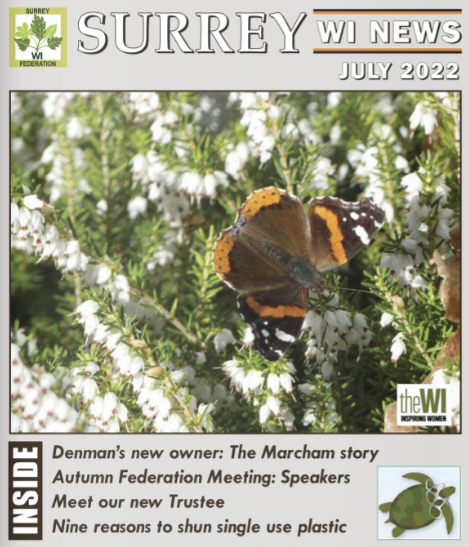
July’s Surrey WI News is now available for you to read online. It is available to view on your phone, tablet or computer via Flipsnack@ July Surrey WI News.
back to News